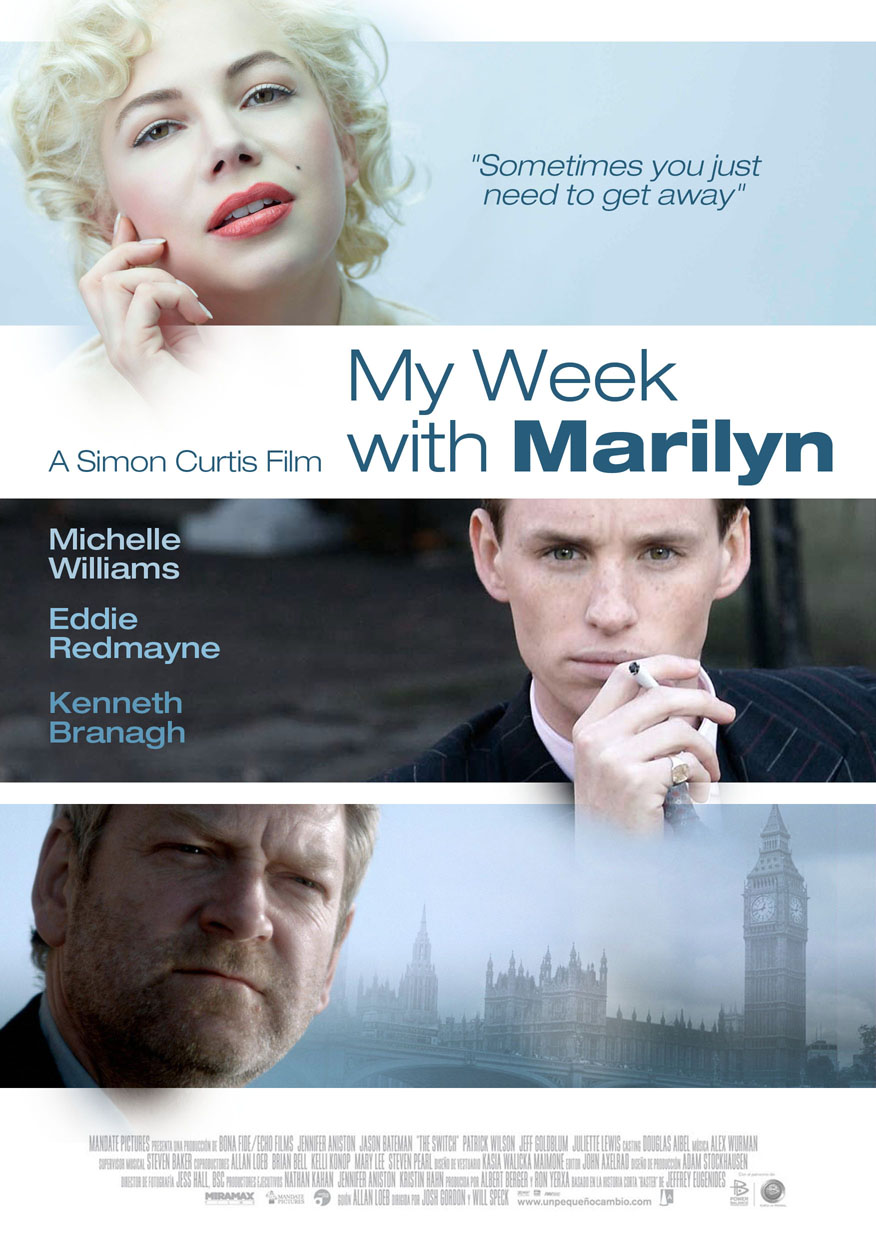jason stives reviews the Oscar bait film starring Michelle Williams as Marilyn Monroe …
My Week With Marilyn, a movie about Marilyn Monroe and her personal encounter with a young film lover in the mid 1950s, continues a trend that plagued the past year. It’s another straight-laced biopic that emphasizes what is already implied about its subject and adds little to its history. However, it still finds time to create some lovely performances that are both surreal and heartwarming regardless of the playing-safe nature of the film, adding an aura of fantasy that many budding film thespians always dream of.
The trouble with My Week With Marilyn lies in a very bland story. While it is based on Colin Clark’s 1995 memoir, The Prince, The Showgirl, And Me, about his week with the ultimate film star of her days, is mainly a dubious love letter to obsession. In no way is the main character obsessive, but it’s almost one-sided in presentation as if the rest of the world doesn’t understand the former Norma Jean Baker except for our narrator. This almost enforces what many historians and fans of her work have always projected was the real truth behind Monroe — that it wasn’t all blond hair, Playboy, and the Kennedy compound. If anything is learned or at least consistently emphasized in this film is the notion of how Marilyn felt she should be treated. Constantly ogled and called upon to perform for being sultry and alluring, she wanted to be taken serious much more than the rest of Hollywood and the film world did. It’s implied here that she was truly the first actress to attempt method acting — something that Williams obviously employed in studying for this role.
The film chronicles a week in 1956 when Marilyn Monroe was in England filming The Prince And The Showgirl, a film directed by and co-starring Laurence Olivier. While the production is marred by Monroe’s anxieties of performing in front of such esteemed actors, she finds a sense of normality in Colin Clark, an admirer of her work and film in general, who is on set working as a third assistant director.
There is much to be said about what hurts the film, but it’s nonetheless filled with some wonderful performances that makes the film charming, regardless if it’s a tale rehashed multiple times over the past 10 years as far as pseudo-biopics go.
While it may come off as a one-sided story from a real dreamer, actor Eddie Redmayne is quite stupidly charming as Clark, and for obvious reasons. His lanky gee-golly exterior really emphasizes his (and in many ways filmgoers’) love for the cinema. Being spry and bug-eyed to a world of lavish costumes, sets and acting is a wet dream to this sheltered 23-year-old-legacy — but it’s the harsh reality of the world these people live in that sends him back into reality. Redmayne plays it off well, and though you can’t help but think Clark is a little too into this notion and maybe a little too steeped in a fantasy world, you are sympathetic to his love for movies and for Marilyn. When he ultimately has his heart broken by the truth of the film industry, he shines with happiness knowing that he has discovered his true self. For a character that is told to grow up by his aristocratic family, he is far more mature than most of his surrounding co-stars, and against the child-like quality of Monroe, he is the civil one in a world full of perfectionists.
The centerpiece is, of course, Michelle Williams’ performance as Monroe, and it’s quite remarkable to watch. When most actors play noted people, tend to still bleed through as the actors they are — like Leonardo DiCaprio as Howard Hughes in The Aviator or Joaquin Phoenix as Johnny Cash in Walk The Line. Here, Williams is so convincing in appearance and mannerisms as Marilyn that I didn’t think I was looking at Michelle Williams. Her natural glow and soft-spokedness played up greatly what people desired about her — a slice between pure sexual tension and playful little girl. If there is only one gripe in her performance is that the “performance Marilyn” that people expect of her and what she is suppose to be off-camera seem one in the same — gullible, childlike and a bit deranged. It’s played up for sympathy and you do find yourself in Colin’s shoes, admiring this timid and misunderstood creature. At one point while visiting Colin’s old school, she is flocked to by a bunch of school boys when she turns to Colin and asks, “Should I be her?” — implying that she should turn on the persona everyone expects. When she does, it’s almost shocking how well it comes out, and in that you get a sense of what was admirable and honest about her as an actress even if it was understated throughout her career.
In a way, this is a movie that suffers from a very watered-down story and side characters that show no individual purpose, but when the film works, it works very well, mainly in its romanticism with people looking to escape into the film world. Outside of our two leads, many of the performances are either wonderfully performed or wonderfully painted on for mere spectacle. British stalwart Dame Judi Dench shines as she always does playing esteemed actress Sybil Thorndike, and Zoe Wanamaker as Marilyn’s constantly overprotective acting coach Paula Strasberg gives a nice balance of surreal and truthfulness.
Kenneth Branagh’s portrayal of Sir Lawrence Olivier is warranted and well-acted but given more villainy to stretch the point that while real actors admired her stardom, they didn’t like Marilyn. As Colin says to Marilyn mid-film, Olivier is “a real actor who wants to be a film star, and she is a film star wanting to be a real actress.” You sympathize with his desire to see his body of work rewarded but sneer at the pompous unlawful ways he treats her, which while a bit truthful of the real life Olivier, here it is hammed up a bit to make a point. Emma Watson is sadly the most wasted of the characters, playing Lucy, a costume-fitter who likes Colin but sees nothing but a dreamer in his eyes. In a way, that may be her main purpose, but coming off of 10 years of Hermione Granger in the Harry Potter films, she probably could benefit from having a meatier role in such a talked-about film like this.
It’s this amongst many things that hurts a film ripe with presentation and pedigree but sadly lacks a fundamental meaning to existence other than bringing to life a schoolboy’s diary. These aside, My Week with Marilyn is satisfying for the moviegoer who yearns to escape into that world and for Grade A performances. Like Colin says in the film about Olivier and Monroe’s need to make their film, “it’s a film they need to make them great but it won’t be.”
Rating: 6.5 out of 10 (Good)



